The Best Alternatives to MyFitnessPal for iPhone & Android
Staying healthy involves tracking food and exercise habits. While MyFitnessPal is a popular app for this purpose, there are other options with unique features to suit different needs.
In this article, we’ll explore seven MyFitnessPal alternatives, discussing their features, pros, and cons. These apps can help you with meal planning, community support, or macro tracking, but they shouldn’t replace a healthy lifestyle or professional medical advice.
1. Lose It!
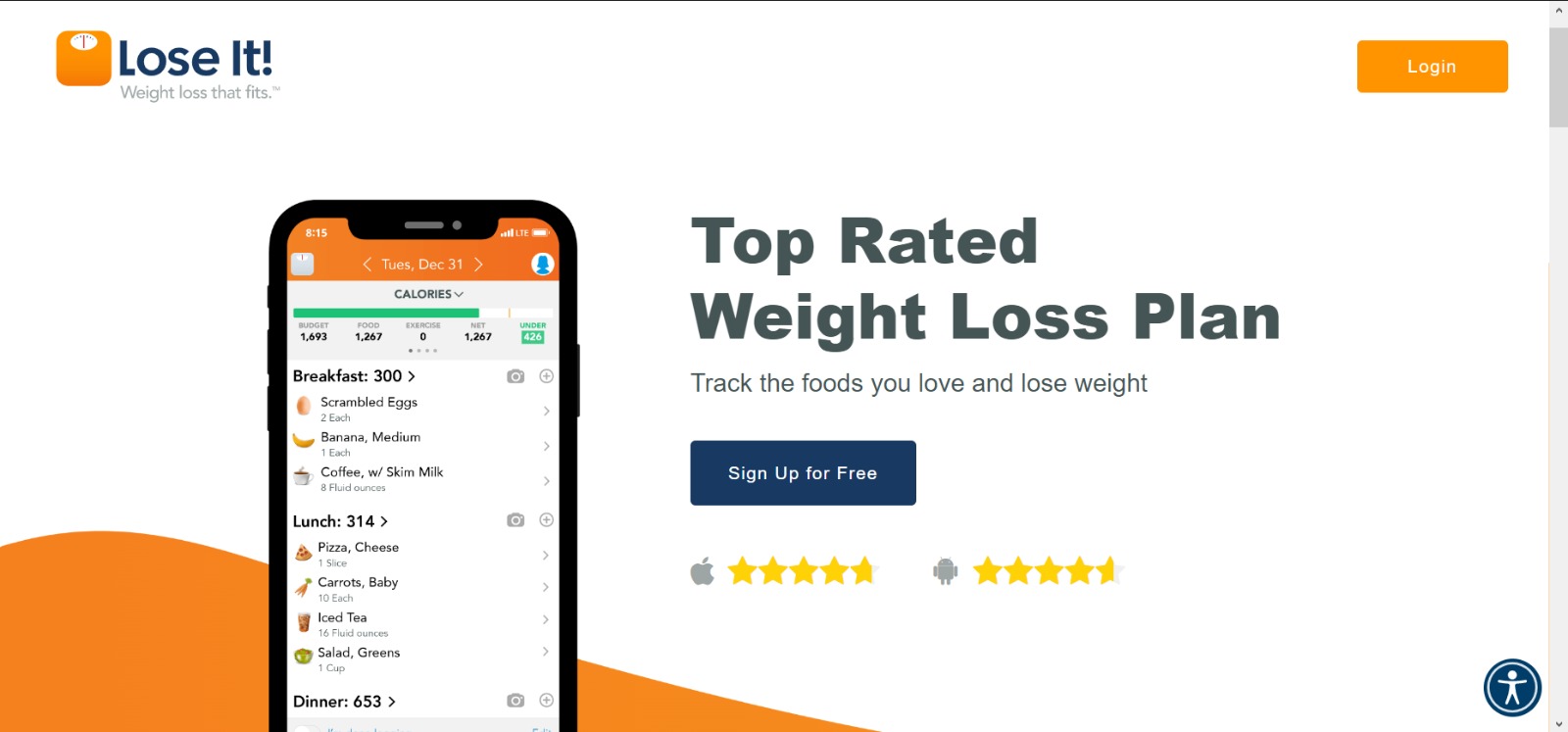
Lose It! is a mobile application designed by FitNow Inc. specifically to reduce weight. Its 1.4 million monthly active users and more than 32 million foods are included in its database, making it one of the most comprehensive food monitoring tools. It is available on both iOS and Android.
When creating your account, you’ll be asked to fill out some information about your lifestyle, including whether or not you’ve ever tried to lose weight and what drives you to succeed. While creating an account and beginning to track your diet is free, unlocking additional features like custom goals and habit tracking requires an upgrade.
In addition, the app’s barcode scanner and ‘Snap It‘ functionality make it possible to record meals by picture. Lose It! will help you stick to your diet and exercise plans. Delivers weekly and monthly reports detailing your calorie and nutrient consumption and charts detailing your weight loss progress.
Pros
- The most comprehensive database of any food diary
- Many types of restaurant food are included.
- Availability of online recipe downloads with nutritional information
- The option to “quick add” nutrients when you lack time to record the entire meal.
Cons
- Calorie figures aren’t always correct because people upload most foods.
- The same product may have multiple listings.
2. Lifesum

Many health and fitness enthusiasts prefer Lifesum to MyFitnessPal because of its comprehensive activity and nutrition tracking features. This app’s user interface is colorful and visually appealing, making it a good fit for millennials.
The app’s user-friendliness stems from a personalized profile, food preferences, and goals being established with a few taps. The app will generate a personalized eating plan after you’ve filled out a short profile. The Lifesum app’s built-in barcode scanner and massive food database, which includes millions of food products, make it simple to modify your eating habits.
You can use Lifesum to keep track of your macros and net carbs, making it suitable for those on a fasting diet. Lifesum provides daily reports and an overall “Life Score” based on the data you enter.
Pros
- A grading system for restaurants and fast food outlets that rewards “Healthier” options
- User-friendly food-tracking with a minimalist design
- Instructional material
Cons
- User-uploaded food entries might have errors
- No online communities
3. Cronometer
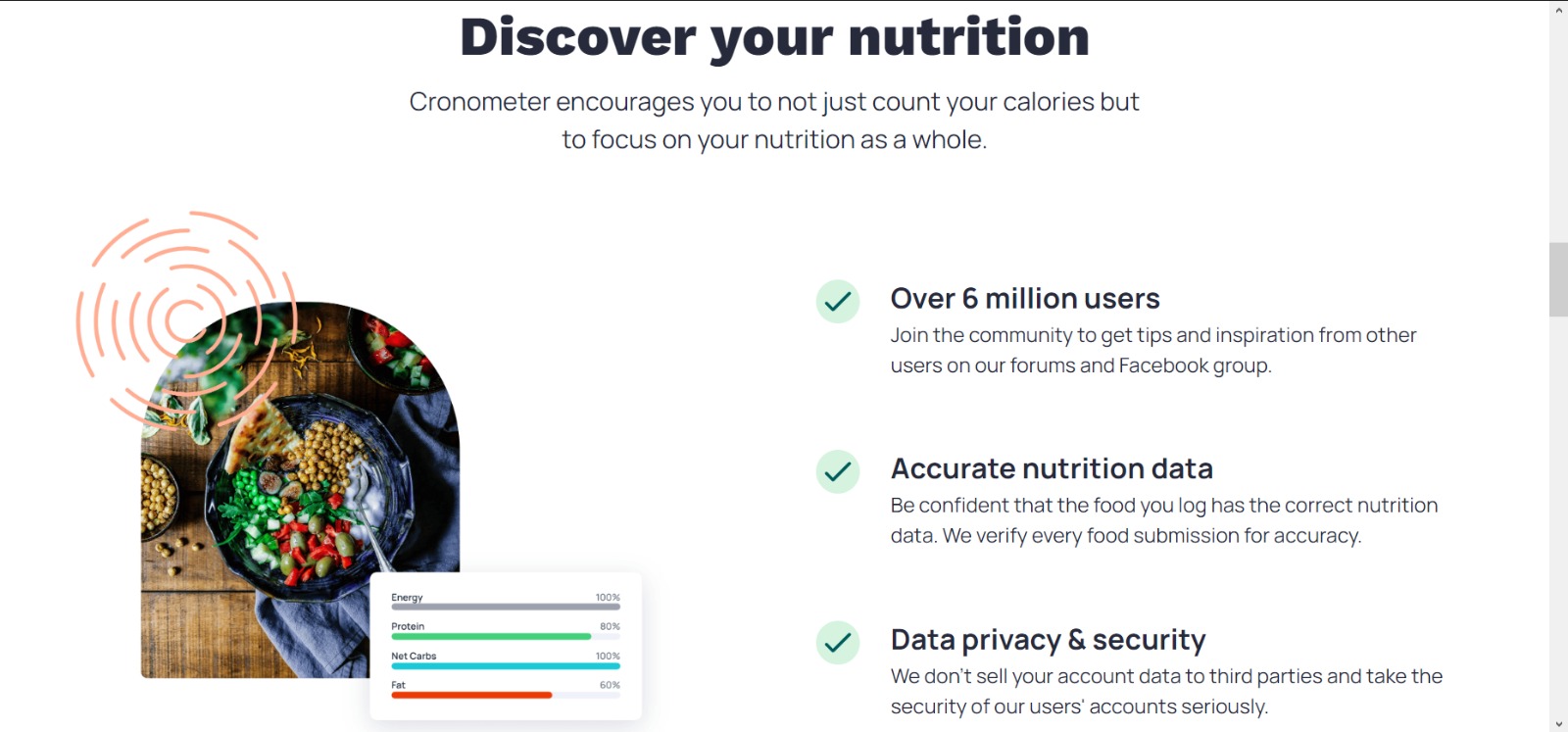
Cronometer is another solid nutrition-tracking app that can be used as an alternative to MyFitnessPal. It can be employed to keep tabs on macro, micronutrients and calories.
You can also record supplements, add in your own cuisine and recipes, and scan barcodes from food packaging. Cronometer, on the other hand, verifies the correctness of each food item you add to its database.
Cronometer is a freemium app in the same style as MyFitnessPal. The free app lets you keep track of quite a bit, but the paid version (Cronometer Pro) unlocks even more functionality. Some of the perks of upgrading include access to exclusive content, ad removal, a recipe importer, and meal-planning recommendations.
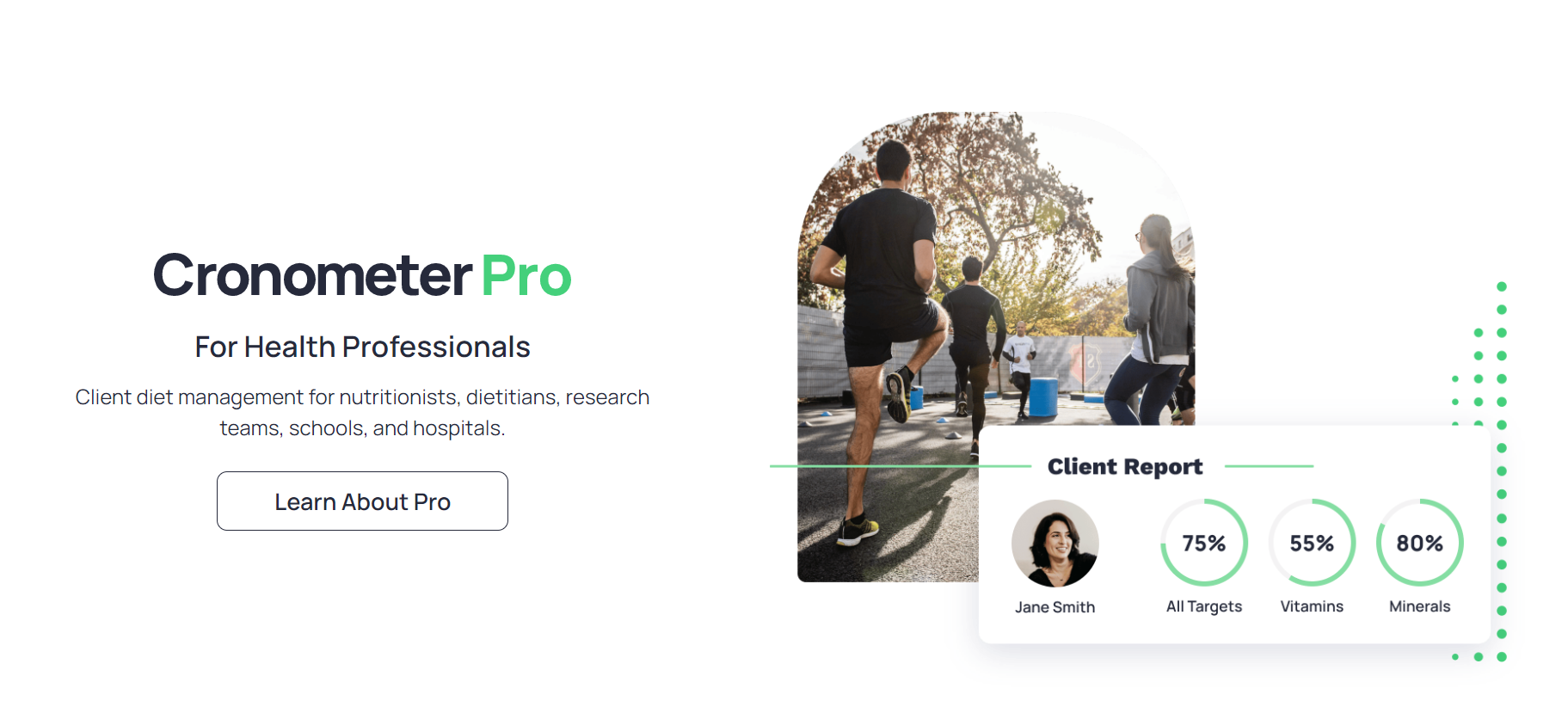
Pros
- Easy to navigate and operate.
- Weight, body fat proportion, sleep data, and activity logs can all be imported from external health devices and synced with the app.
- Keeps watches on every nutrient, including the trace elements, minerals, and vitamins
- The app is available to low-eyesight users because it includes a voiceover feature.
Cons
- You can only add your home-cooked meals to the website, not the app, but those recipes will be accessible in the app after they have been added.
- There isn’t any sort of user community.
4. Calorie Counter by FatSecret

The Calorie Counter by FatSecret app helps users track calories and maintain a healthy diet. It’s a basic app that integrates well with other programs and services. The collection of healthy foods and nutrients in this app is extensive.
There is a sizable online community that functions much like MyFitnessPal. This app can sync with external fitness trackers like Google Fit, Samsung Health, and Fitbit. In addition, the app provides a planner for recording your development.
FatSecret Professional is compatible with the mobile app FatSecret. So it’s simple to talk about your diet with your doctor. When you link your accounts, information from either can be viewed in the other.

Pros
- A large database of foods, including those found in grocery stores and meals
- You can see foods that other users have reported. So you can double-check to see if the data is accurate.
- Display net carbohydrates, which can be helpful for those on a low-carb diet.
Cons
- User Interface that is confusing and hectic.
5. Noom
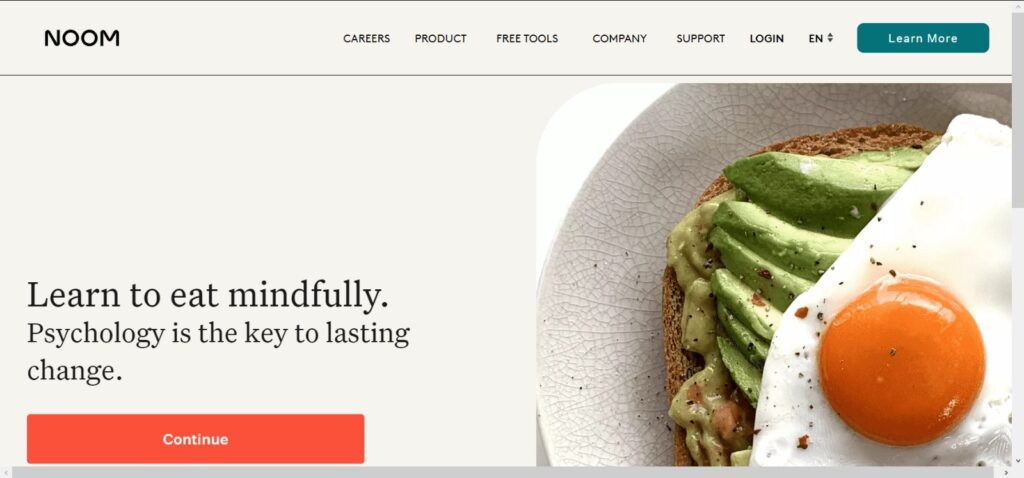
Calorie tracking, education, and personalized coaching are the key components of Noom‘s behavioral approach to weight management. It can be preferable to MyFitnessPal for those who care equally about their mental health along with physical well-being.
Noom’s goal is to assist its users in understanding their eating patterns and making positive changes by providing them with personalized support from trained coaches.
The app’s calorie counter provides a visual representation of your eating habits through the use of color coding. It provides a quick comparison between high-calorie items (in red) and those high in nutrients (in green) that will keep you feeling full for longer.
Its database also includes over a thousand recipes, and each color-coded to show how well they match your objectives. However, the main selling point of Noom is not a calorie counter but rather the way it acts as a personal coach.
After signing up, users are assigned a coach who periodically checks in via live chat during the week. Users get access to their coaches and the rest of the Noom community whenever they need it.
Pros
- Weekly check-ins and one-on-one sessions with a coach
- Integrated barcode reader included
- Easy to see progress in calorie quality and totals
- Meal planning and over a thousand recipes
Cons
- Pricey
- Unclear billing procedures
6. MyNetDiary
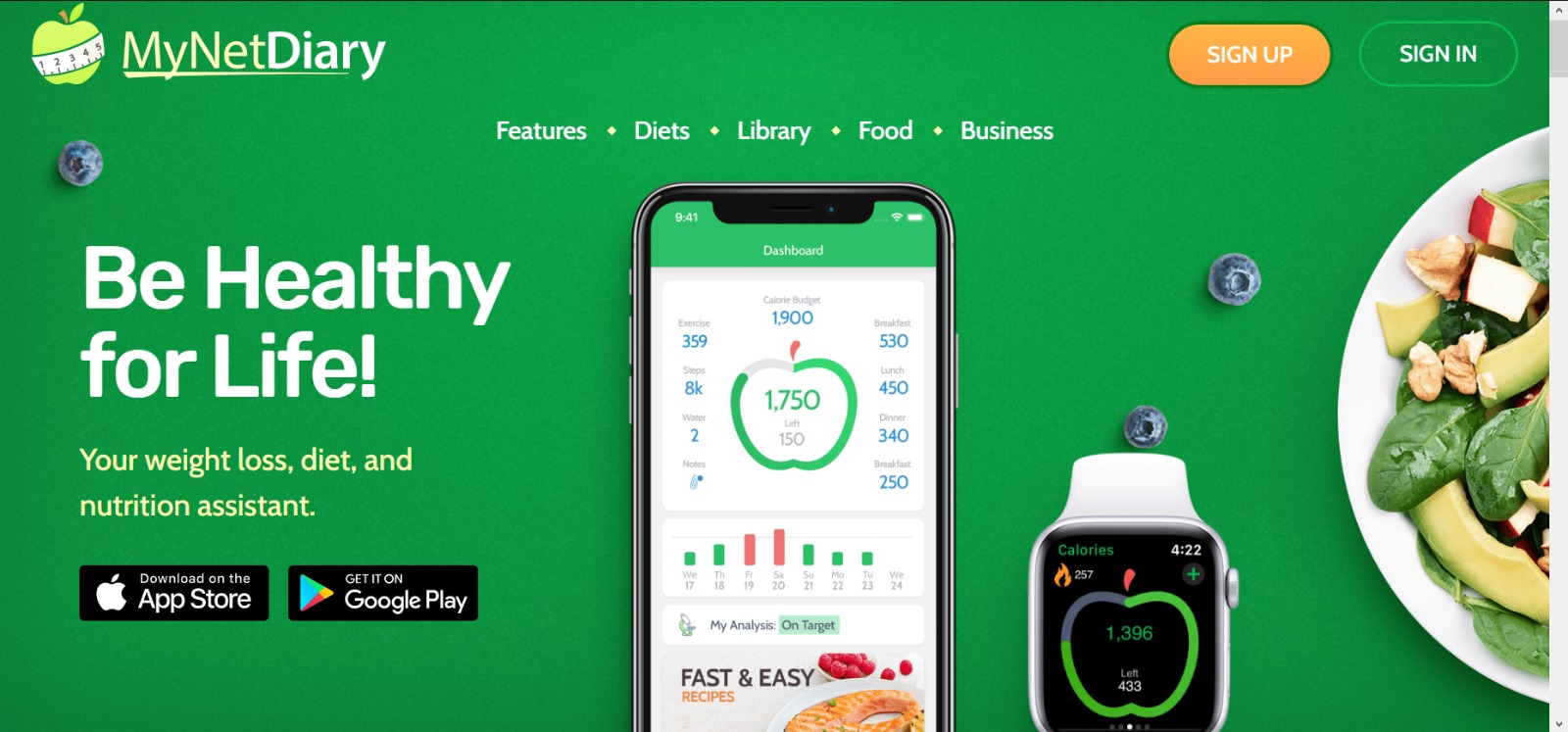
You can keep track of everything from your food and exercise habits to your medication and water intake with the help of the free mobile app MyNetDiary, which is also compatible with the iPhone, iPad, and Apple Watch. MyNetDiary is an easy-to-use online food diary that can be helpful in the pursuit of healthy body composition.
A trustworthy source for recording your regular meals, MyNetDiary also has an astonishing 1,360,000 validated foods in its food library. The app streamlines the process of keeping track of what you eat by letting you scan barcodes and save your most often recorded meals.
MyNetDiary also includes a food grade, which assigns each food an alphabetical letter grade from A to D based on its nutritional value. This function can save you time and effort spent reading labels for healthier food options.
Pros
- Easy food tracking
- A flexible, goal-oriented calorie-daily-estimator
- Compatible with weight loss, weight growth, and weight control objectives
- Participation in a group led by a certified dietician
- Tasty meal suggestions, complete with directions
Cons
- Macros tracking app subscription required
- The virtual coach is not real.
7. Calory App
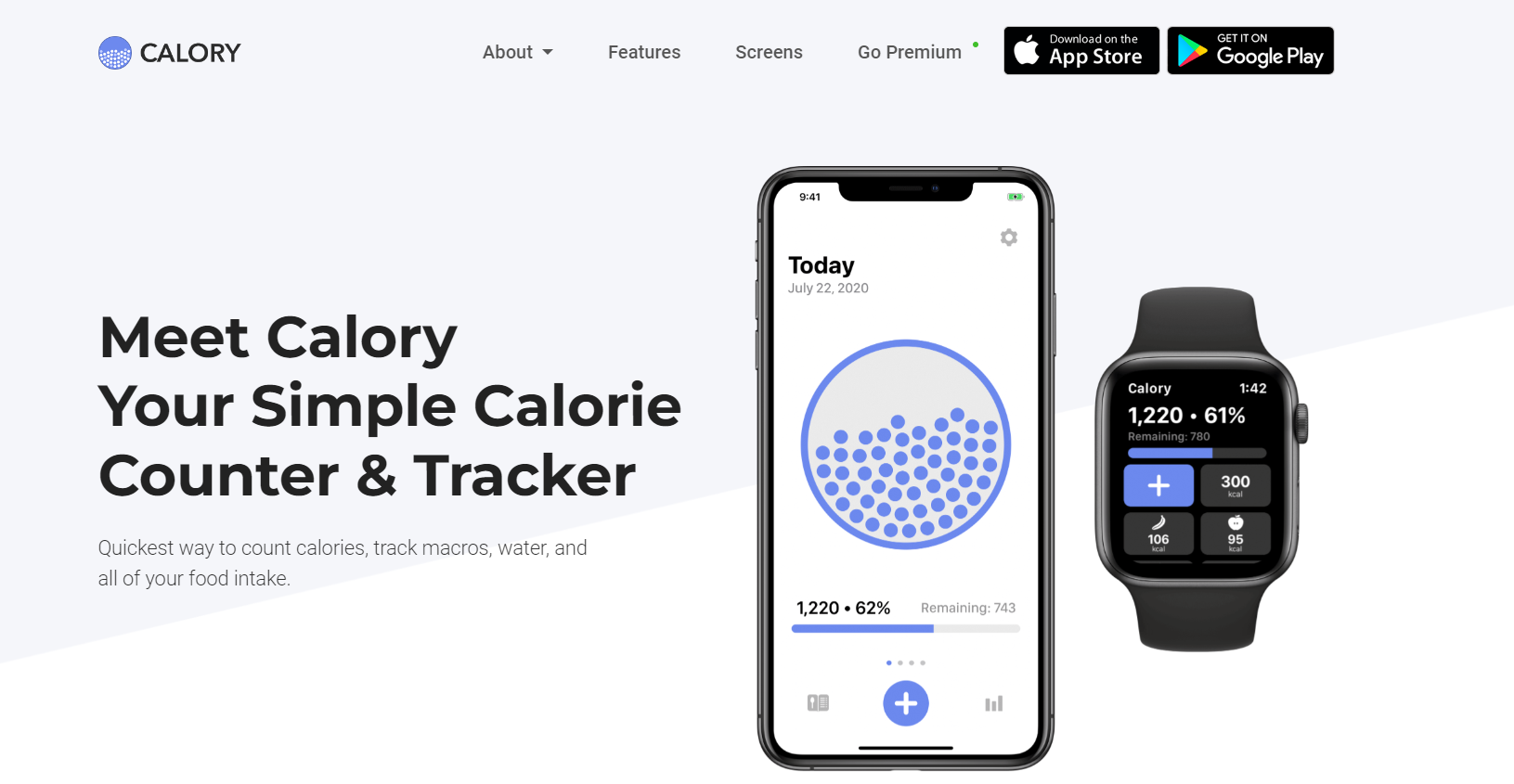
Calory is a calorie-tracking app developer by lya Birman Design & Type, that tracks how much you eat and how many calories you burn. The user enters their weight, height, exercise level, and desired weight loss/maintenance/gain, and the app returns a daily calorie goal.
Calory is a simple and efficient way to keep track of your calorie intake. Using Calorie Premium, you can set daily targets for macronutrients, including carbohydrates, proteins, fats, salt, and more.
Use the fluctuating calorie particles to see your daily progress. View weekly, monthly, and annual progress charts that provide a great snapshot of your past. Calory is compatible with Apple Health. Your eating habits are recorded in an individual Health record.
Calory is a calorie tracker, calculator, and a way to monitor fluid intake. It helps you keep a tally of how much water you consume each day. Make your own unique meals, and if you need some ideas, Calory has thousands of recipes. Calory summarizes your food notebook history through weekly, monthly, and yearly performance charts.
Pros
- It contains suggestions to log your calories.
- A food database connected to the primary USDA food database
- Compatible with many health apps
- The fluid intake monitoring feature is very helpful.
Cons
- Only logs daily calories; need paying upgrade to log macros.
 Reviewed by
Reviewed by 




